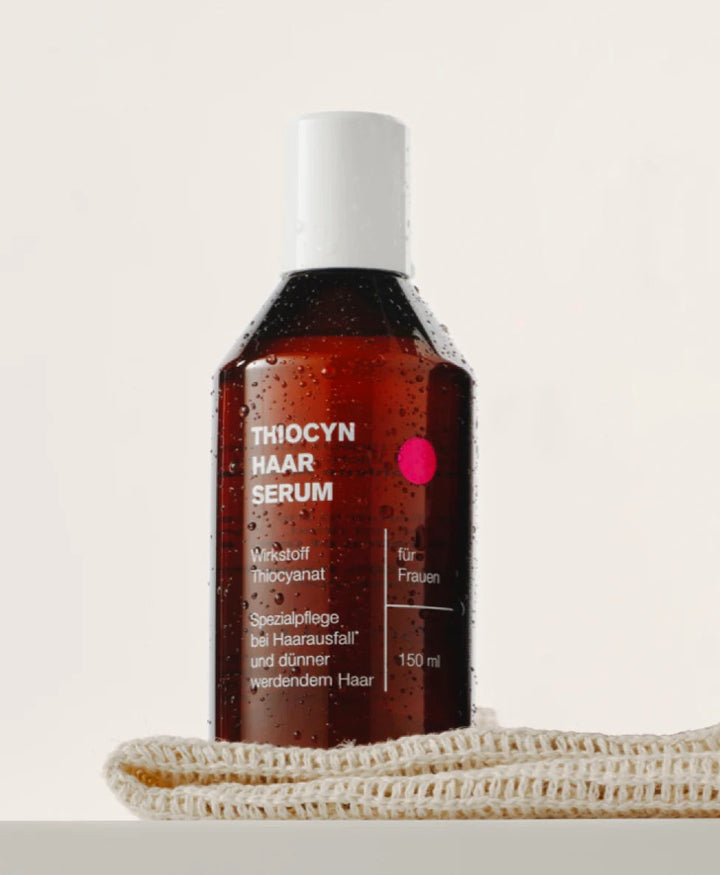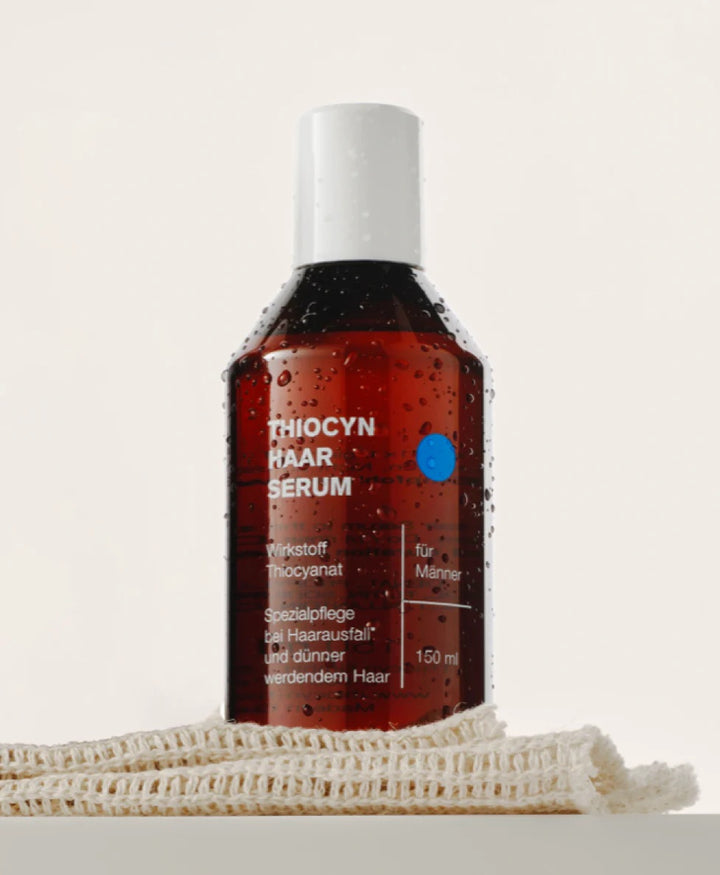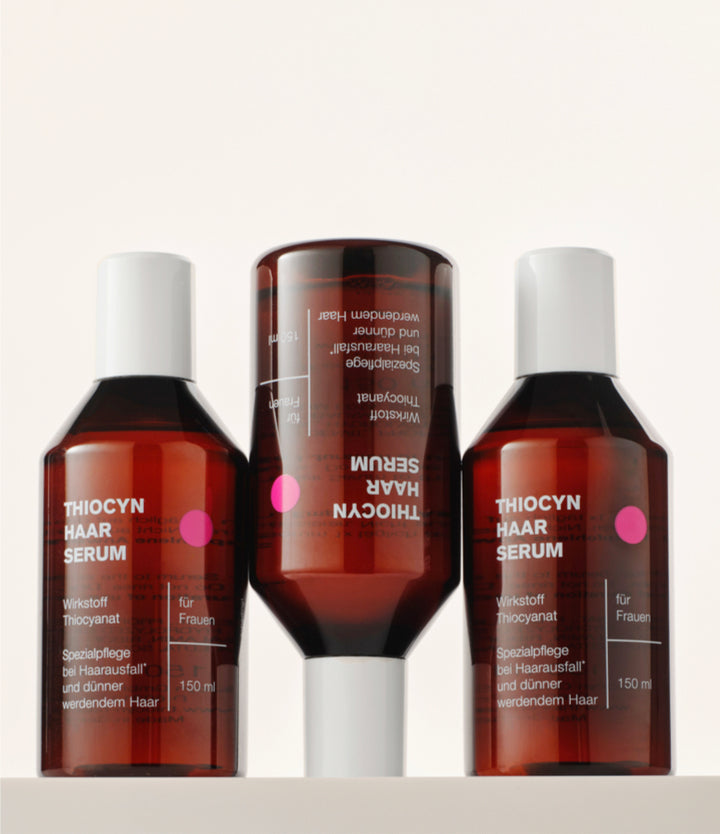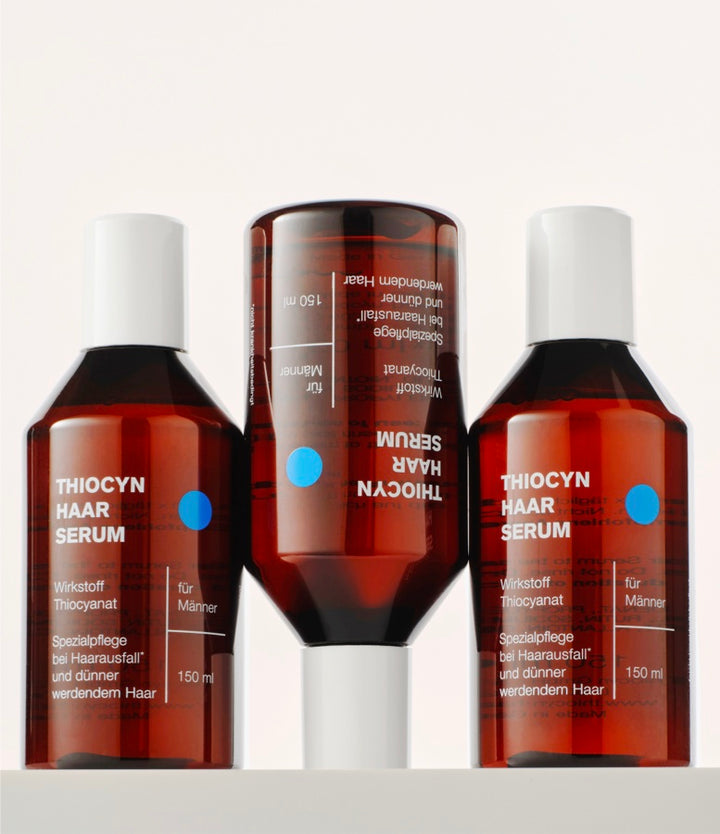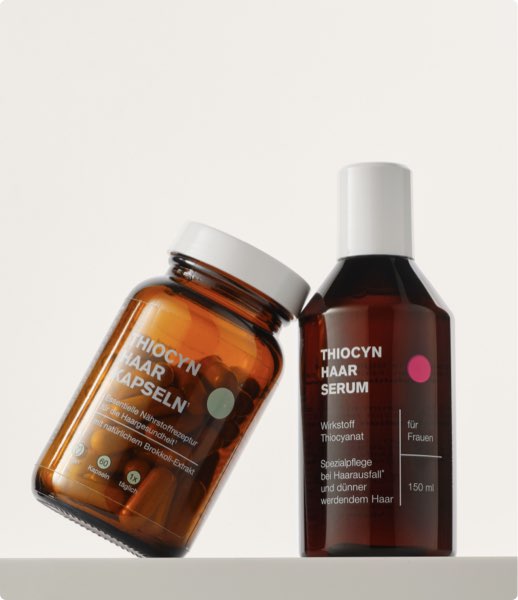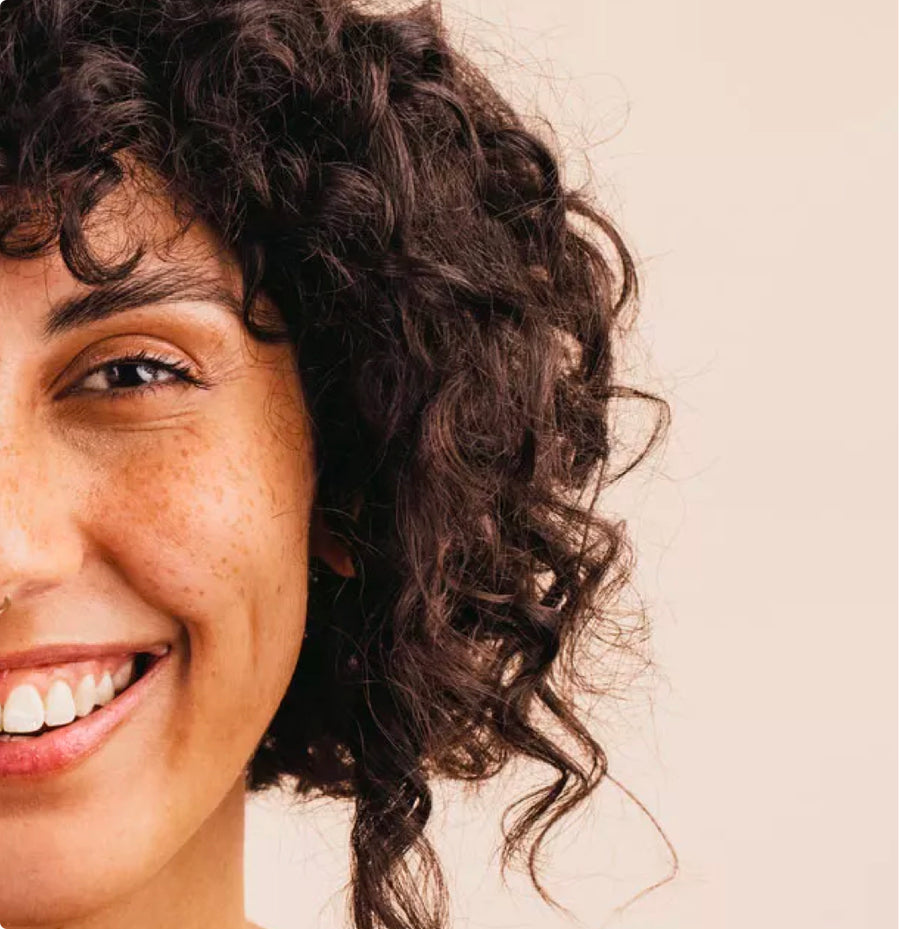| 04. July 2023
Hair loss after pregnancy
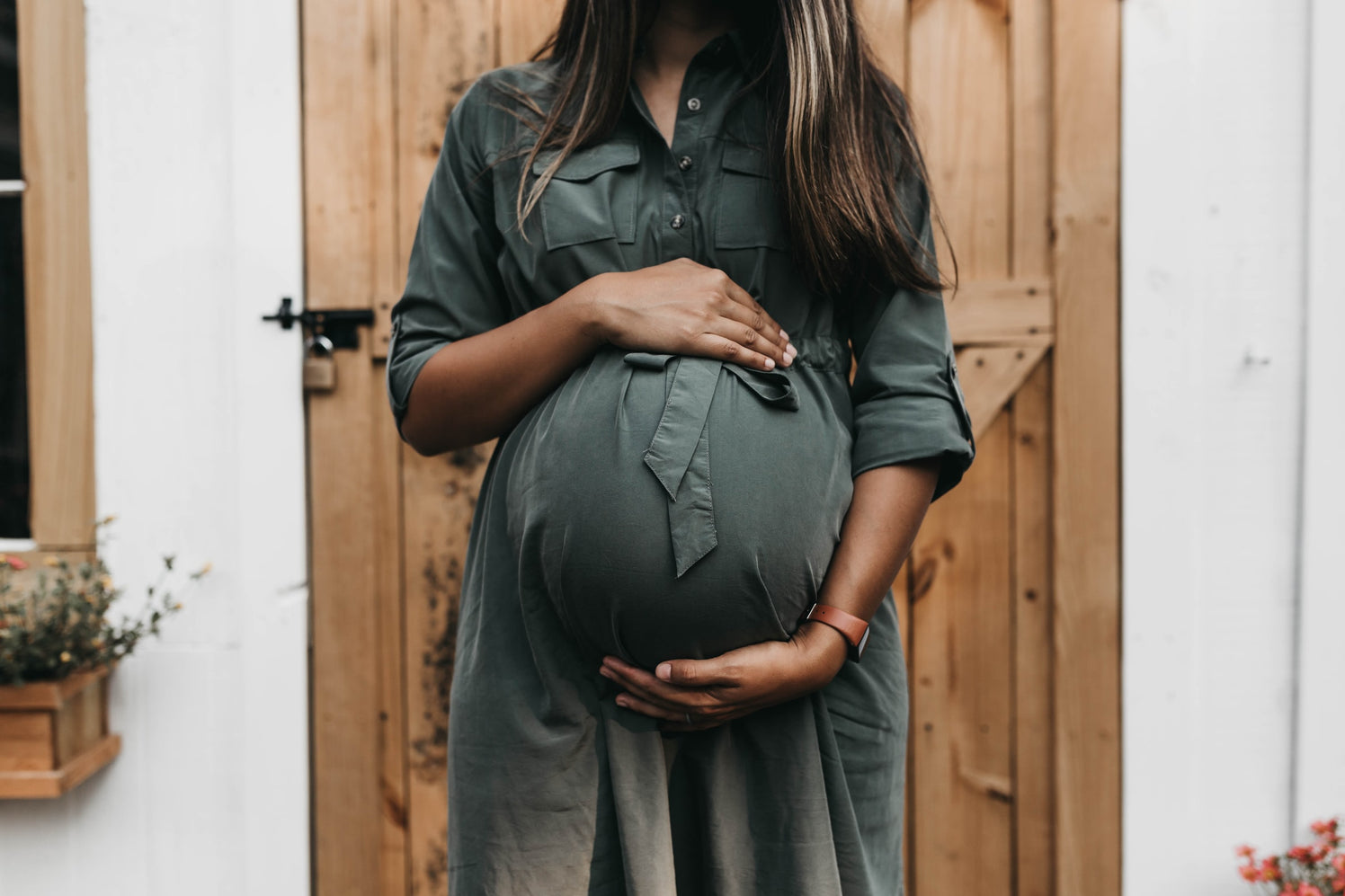
- Children, children! Once the baby arrives, your hair falls out two to three months after pregnancy.
- This condition usually lasts a few weeks, up to six months. This is completely normal.
- When estrogen levels are balanced, hair grows back healthy and strong.
- Thiocyn hair serum can help normalize the hair cycle faster after pregnancy.
After a happy birth, women look forward to a normal life without a baby bump and to their bodies recovering. When severe hair loss suddenly sets in, many women are somewhat concerned. Can hair loss after pregnancy be avoided?
With the baby comes hair loss
Your own baby is a small miracle. But for miracles to come true, pregnant women have to go through a lot. While the female body is very well adapted to pregnancy, nine months of physical emergency are always associated with great exertion and changes, which ultimately also put a strain on the pregnant woman's self-image. Hair loss two to three months after birth is not uncommon and is one of the less pleasant side effects of women fulfilling their desire to have children.
Hair loss as the norm
Almost all new mothers are affected to a greater or lesser extent by postpartum effluvium (Latin: postpartum = after birth; effluvium = hair loss), which manifests as diffuse hair loss. Depending on the hair density and texture, women perceive the thinning of their hair either calmly or as threatening. The reason for excessive hair loss is the rapid decline in estrogen levels after childbirth. During pregnancy, estrogens have a dual effect.
1. Optimal pregnancy
Increased female estrogens during pregnancy are essential for the development of the unborn child. They support the expectant mother, for example, in switching her cardiovascular system to dual function and producing more blood to supply the embryo and fetus with sufficient oxygen. Furthermore, estrogens make the skin in the abdominal area more elastic during pregnancy by stimulating skin cells to divide more frequently. Facial skin also benefits. The complexion glows fresh and rosy as a result of improved circulation.
2. Pregnancy makes you beautiful
Estrogen also has a positive effect on hair quality. Many women confirm that their hair has never been so beautiful, strong, and shiny during pregnancy. The reason: The estrogen surge during pregnancy also stimulates cell metabolism at the hair roots, thus leaving more hair in the growth phase. When estrogen levels drop to normal after birth, the hair follicles enter the resting phase. The hair detaches from the hair roots, falls out, and becomes visible, for example, when brushing or washing your hair.
New hair growth after pregnancy
Long, full hair signals femininity. Hair loss after pregnancy can trigger self-doubt, depression, and even anxiety. Don't worry!
Usually, hair loss and thinning hair After pregnancy, this is only a temporary effect. Soon, the hair follicles will begin to produce new hair. The shock of the estrogen deficiency will be overcome, and the hair will grow back as vigorously as before. However, you'll need a bit of patience. Hair grows an average of 1 cm to a maximum of 1.5 cm per month.
If hair loss lasts longer
If hair loss persists after pregnancy, those affected should make an appointment with a doctor at a gynecological or dermatological practice. After a medical history and numerous tests and diagnostic methods, it should be possible to determine the causes fairly quickly, such as:
– Stress due to new life circumstances
– Protein, vitamin, zinc or Iron deficiency due to breastfeeding
– Incorrect nutrition as a result of dieting to lose pregnancy weight
– Thyroid dysfunction
– Infectious diseases
– Inflammation of the scalp
The sooner the cause of hair loss is identified, the sooner hair can grow back. In many cases, a better diet can be the best treatment.

Our recommendation
If hair growth doesn't automatically normalize after pregnancy, Thiocyn Hair Serum can make a valuable contribution to restoring the hair cycle. Its active formula is based on the body's own natural molecule. Thiocyanate , which is involved in many metabolic processes in the body, helps stimulate and stabilize cell metabolism at the hair root. The prophylactic use of thiocyanate during pregnancy is therefore an interesting option for counteracting hair loss* in advance or supporting hair growth immediately after birth.
By the way: Unlike conventional hair-growth-promoting substances, Thiocyn Hair Serum does not interfere with hormone-controlled metabolic processes, as required by law for cosmetics. No side effects or interactions are known.
Enjoy the happiness with your baby – and be happy about your beautiful hair!
Questions for our service team
How long does it take for excessive hair loss to stop after pregnancy?
Hormone levels typically take three to six months after pregnancy to return to normal, which is when excessive hair loss also stops.
What causes hair loss during pregnancy?
Hair loss could be a symptom of iron deficiency. Iron deficiency also has adverse effects on the oxygen supply to the placenta. It is important for both mother and child to optimize their diet. Red meat, fish (sardines), as well as oatmeal (muesli), nuts, and almonds are rich in iron. Iron supplements may be necessary to support adequate iron intake.
How can you measure iron deficiency?
Through the blood count, specifically the ferretin level. Ferretin is a protein that stores iron.
Does breast milk provide the baby with nutrients that the hair of breastfeeding women actually needs?
No, hair loss increases after birth and during breastfeeding because estrogen levels drop.
Dyeing your hair during pregnancy?
If pregnant women abstain from alcohol and nicotine, then the chemicals in hair dyes should also be considered for the health of the unborn child. On the other hand, coloring during pregnancy isn't a big issue for most women anyway, due to their good hair quality.
Why do women have better skin, nails and hair during pregnancy?
Increased levels of the growth hormone estrogen during pregnancy are good for the child, but also for the expectant mother. The bump must grow with the baby. This can only be achieved with rapid cell division. Hair and nails also grow faster.
READ BY 23,000 PEOPLE
Join 23,000 others and find out how to improve your hair health with great offers and discounts as well as helpful advice
